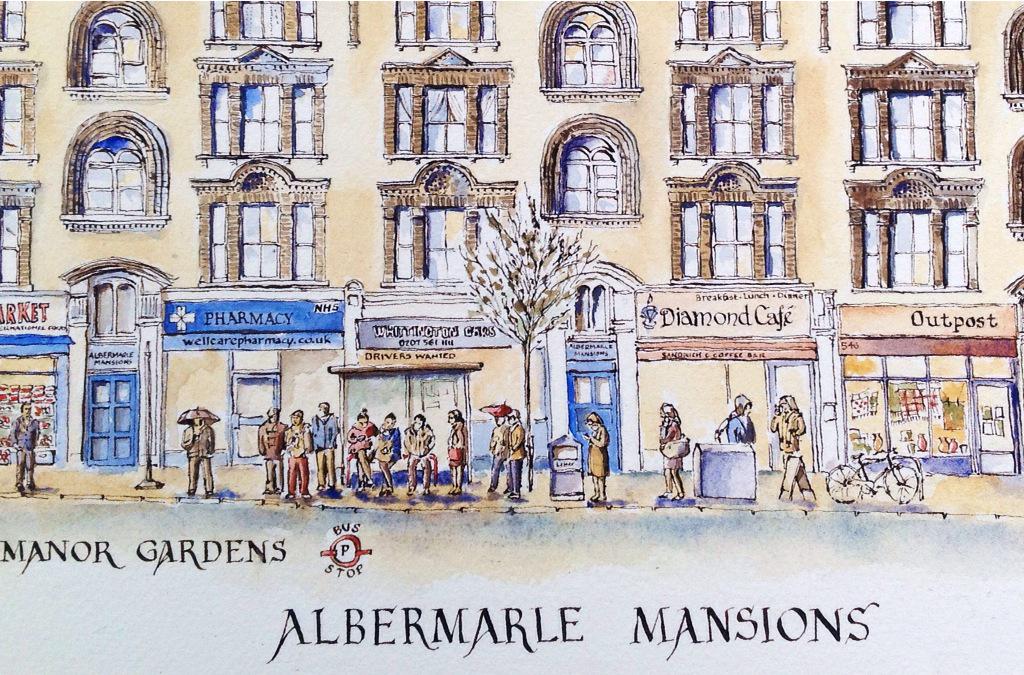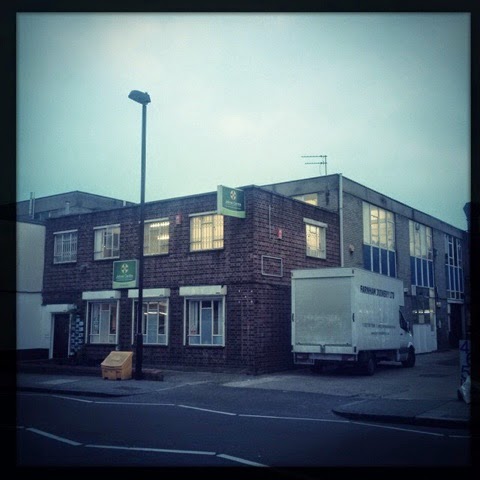 |
| By @ronniecruwys of drawingthestreet.co.uk |
This is the last of the Albermarle Mansions stories and it might be the best. Here goes:
'
Stated by the police to be considered in Ireland a very daring and dangerous criminal, George Green (34) whose address was given as Albemarle Mansions, Holloway, was convicted with Herman Rowland Panzer* (39), of the same address, of the theft of a duplicating machine from an office at Isleworth, at Brentford today.
The police said that Green had been convicted for causing assemblies, for being responsible for outrages, for escaping from Cork prison, and for shooting at an inspector for which he had had 20 strokes of the cat.
In this country he had been convicted for robbing a bank and for being concerned in the stealing of firearms and 10,275 rounds of ammunition. He was, added the police, a very daring gunman who did not hesitate to shoot to avoid arrest.
Green and Panzer were sentenced to six months' imprisonment on the present charge.'
 |
| By @ronniecruwys of drawingthestreet.co.uk |
This piece appeared word for word in the 3 April 1929 editions of the Derby Daily Telegraph, the Gloucestershire Echo, Hull Daily Mail, the Hartlepool Mail, and the Nottingham Evening Post. On 4 April the Western Daily Press picked it up. None of the London papers covered it. There are no follow-up pieces. Here goes:
'Duplicating machines' are early photocopiers. They're not the kind of thing you'd steal if you were just a thief because they're heavy and anyway, what would you do with one? That's the first hint that we're not dealing with a standard criminal, but with someone who might have wanted to distribute pamphlets or leaflets.
'Causing assemblies' could refer to trade union activity, or to any other form of activism. The link to Ireland means that I.R.A. is the most likely answer.
In 1923 dozens of I.R.A. veterans had escaped from Cork city gaol with the men who facing death going first and the rest waiting their turn according to the length of their sentence. It's one hell of a story (see
here).** I can't find any mention of a George Green that fits the bill in the
online prison archives, but if this were a proper research project rather than what it is I'd wouldn't have given up there.
The Cork prison escape story seems to have been reported only in a short piece in the Western Daily Press.*** Perhaps Irish news didn't sell. Perhaps the Government of the day wasn't keen on the story being covered (but would they have had that much influence on the press? Perhaps the prison authorities in Ireland managed to keep the story quiet?
* A 'Herman Roland [not Rowland] Panzer' was living in 7 Parkhurst Road, Islington 1911 as a 'disengaged' clerk. This thread suggests strongly that he also went by the name of Armyn Roland Panser and married bigamously under both names.
**You can go on a team-building 'Jail Break' adventure at the gaol building. The people who came up with that idea are now working on 'Potato famine: the cook book'.
*** That's all that turns up if you search for 'Cork City Gaol' and 1923 in britishnewspaperarchive.co.uk



